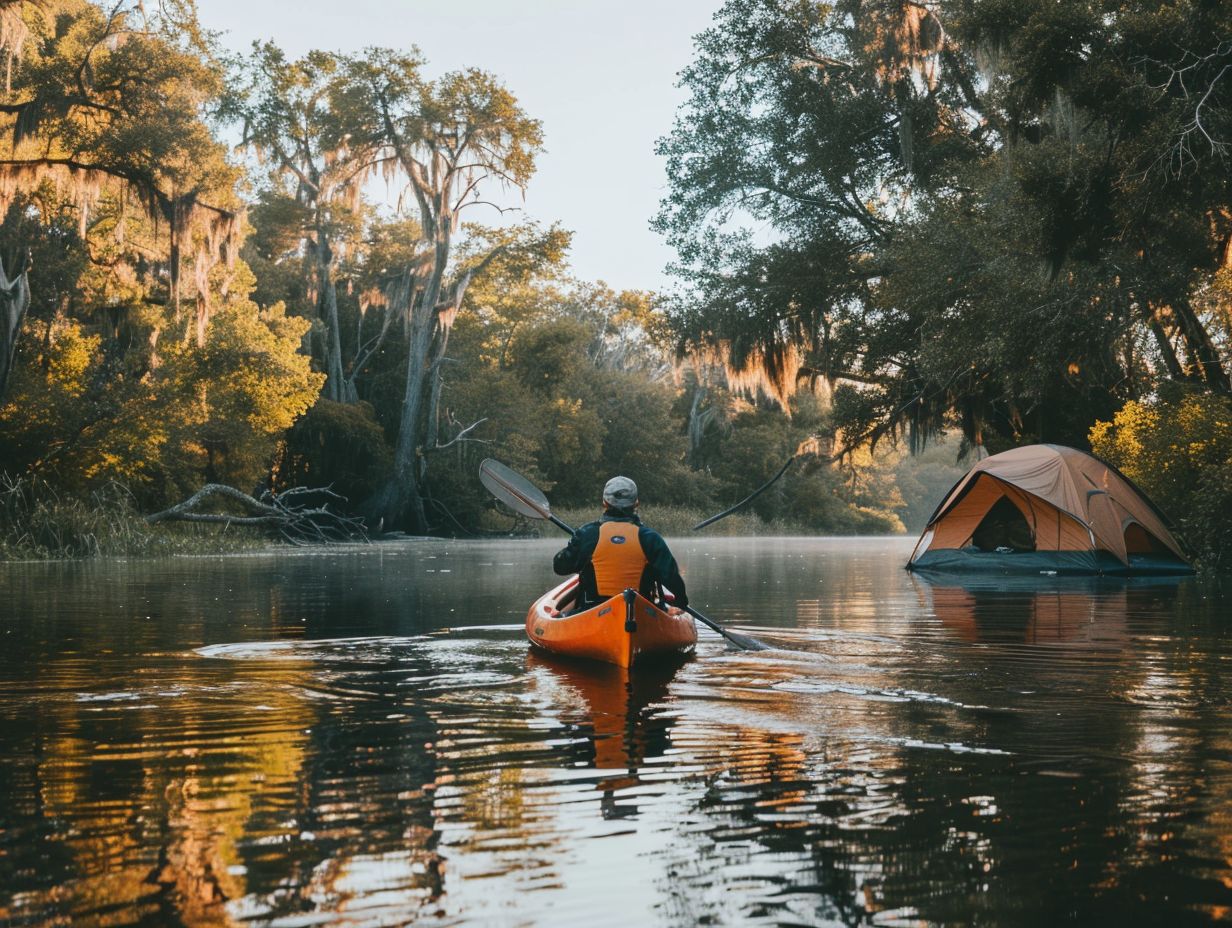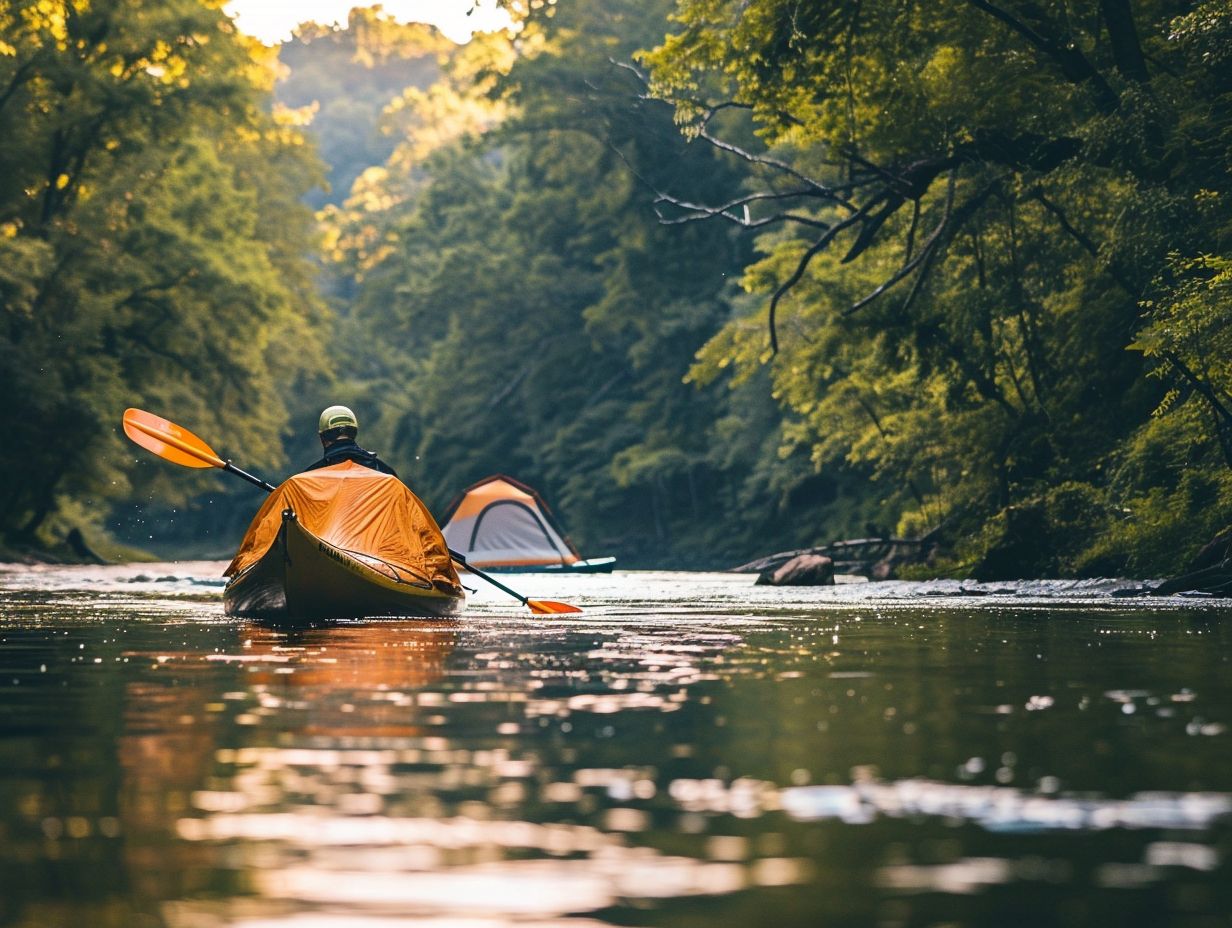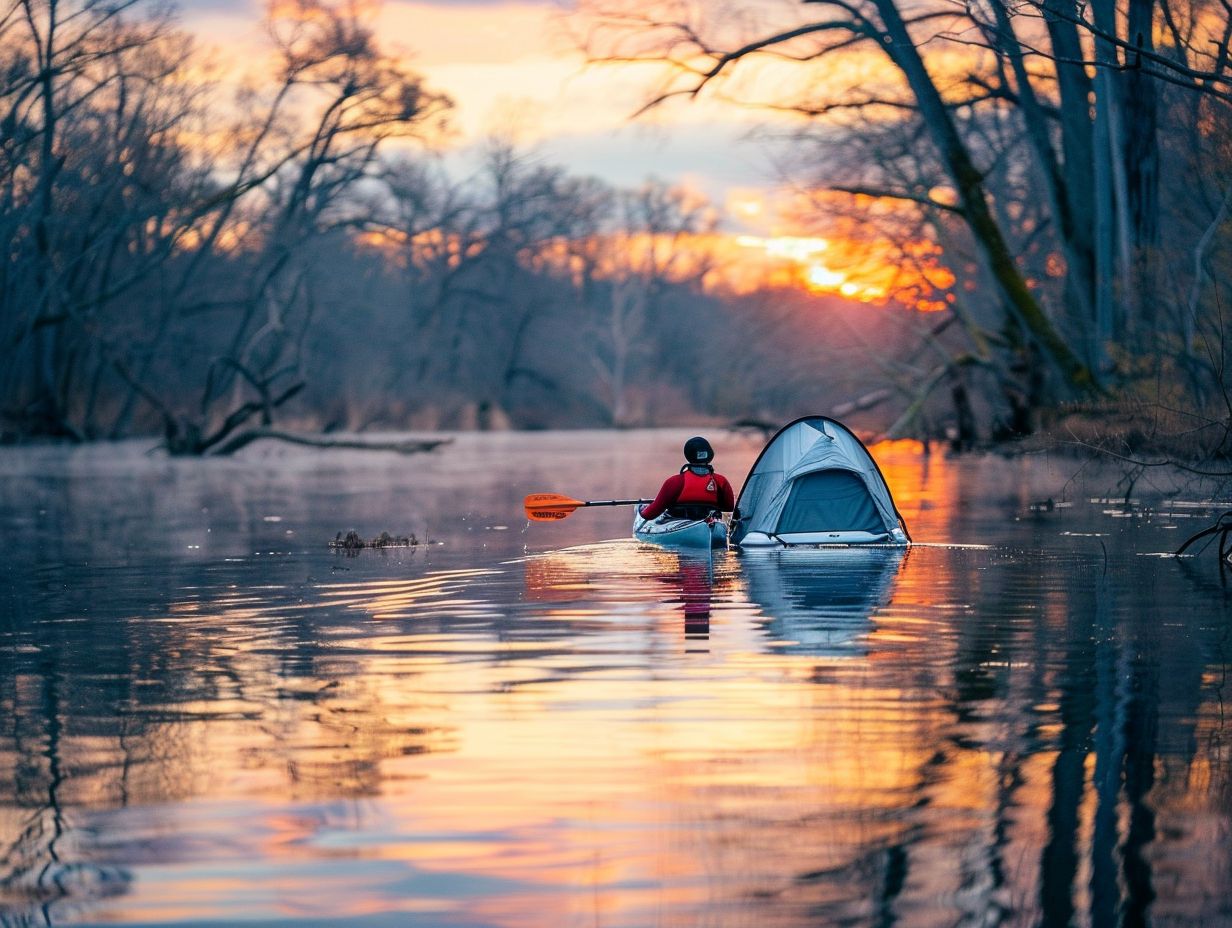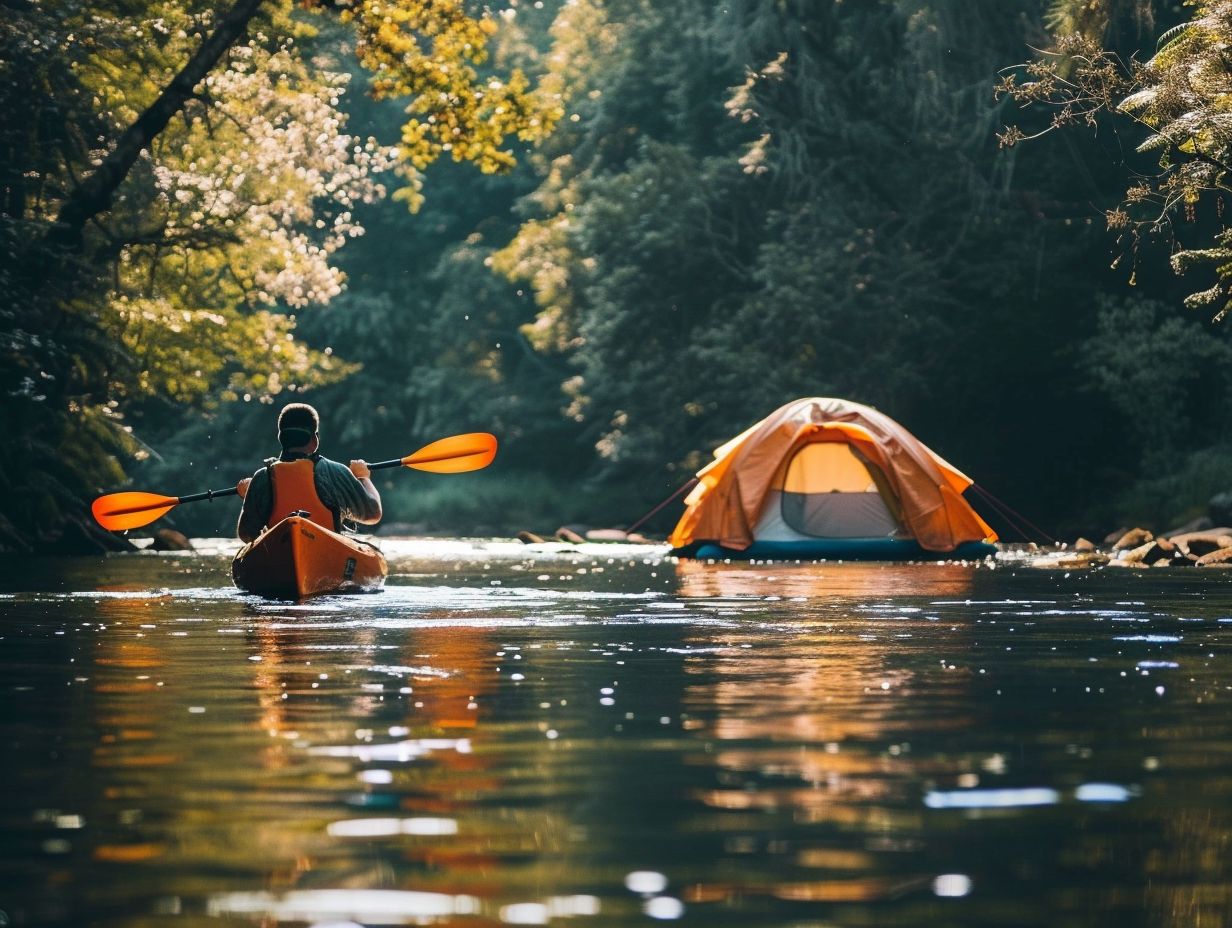If you are seeking an exhilarating outdoor adventure in the UK, consider combining kayaking with camping as a way to fully experience nature and appreciate the beauty of the outdoors.
This detailed guide will delve into the advantages of merging these two activities, the necessary equipment for a successful outing, recommendations for selecting an appropriate location, preparation steps and safety measures to take, fundamental kayaking techniques, camping guidelines and regulations in the UK, as well as important dos and don’ts for a pleasant and seamless experience.
Prepare yourself for an unforgettable journey as we delve into the details.
Key Takeaways:

- Combining kayaking and camping allows for a unique and immersive outdoor experience in the UK.
- Essential gear, proper location selection, and preparation are crucial for a safe and comfortable kayaking and camping trip.
- Understanding campsite rules and Leave No Trace principles, as well as practicing proper techniques, will ensure a successful and enjoyable adventure.
Benefits of Combining Kayaking and Camping
Combining kayaking and camping offers you a unique outdoor adventure experience that allows you to immerse yourself in the serene beauty of nature while exploring the UK’s picturesque waterways. This integration presents a golden opportunity for you to access remote paddling locations that are often inaccessible by road, providing you with a sense of seclusion and tranquility.
Imagine waking up to the gentle sounds of lapping water and birdsong, with the crisp morning air invigorating your senses. Camping close to the water not only offers stunning views but also allows for easy access to kayaking routes, enabling a seamless transition between on-land relaxation and water-based exploration.
Essential Gear for Kayaking and Camping
For a successful kayaking and camping expedition in the UK, ensuring you have the right equipment is paramount. Essential gear includes camping necessities such as tents, sleeping bags, cooking supplies, kayaks or canoes, and safety equipment.
When getting ready for a kayaking and camping journey, it’s crucial to have a comprehensive checklist to guarantee you have all the required items.
Additional camping essentials like portable stoves, water filters, headlamps, and first aid kits can be essential in outdoor settings. Proper attire, including quick-drying layers, sturdy footwear, and rain gear, is crucial for comfort and safety.
Safety equipment such as life jackets, helmets, and navigation tools should never be underestimated. Investing in high-quality equipment and gear will not only enrich your experience but also ensure you are prepared for any unforeseen circumstances.
Must-Have Equipment for a Safe and Comfortable Trip
Ensuring you have essential equipment is crucial for a safe and comfortable kayaking and camping adventure. Items like life jackets, navigation tools, first aid kits, and waterproof storage solutions are necessary for a worry-free experience.
Along with these basics, investing in a durable kayak with proper seating and adjustable footrests can improve your comfort during extended paddling sessions. Packing lightweight yet nutrient-rich food options and a portable stove for cooking will help you stay energised throughout your journey.
A dependable tent, sleeping bag, and camping stove are vital for a peaceful night under the open sky. Don’t forget to bring a repair kit for any quick fixes on the go and to practise proper kayak rescue techniques before heading out onto the water.
Choosing the Right Location
When planning a kayaking and camping adventure in the UK, it is crucial for you to carefully select the ideal location. Take into consideration the diverse waterways available in the UK, including rivers, lakes, and canals, which offer a range of paddling experiences. Additionally, explore suitable camping spots to enhance the overall quality of your trip.
Coastal kayaking in the UK presents a unique opportunity to discover sea cliffs, caves, and marine wildlife. If you are looking for a blend of adventure and tranquillity, the South West Coast Path is a fantastic option, providing stunning coastal paddling routes along rugged cliffs and sandy beaches.
For those interested in wild camping, secluded spots along the Pembrokeshire Coast in Wales offer a chance to set up camp amidst breathtaking scenery.
It is essential for you to identify waterways that align with your skill level and personal preferences to ensure a safe and enjoyable kayaking and camping experience.
Factors to consider when selecting a kayaking and camping spot

When choosing a kayaking and camping spot, you should carefully consider several factors to ensure a successful trip. Factors such as water conditions, available paddling locations, the suitability of the camping pitch, and any unique traditions related to canoe camping in the area are all important considerations.
It is crucial to assess the water conditions before embarking on your kayaking journey. For a safe and enjoyable experience, beginners may prefer calm waters, while more experienced paddlers might seek out spots with currents or waves to challenge their skills.
Exploring the various paddling locations available can offer a diverse range of experiences, from tranquil lake settings to more adventurous river routes.
Finding a suitable camping pitch is essential for a comfortable stay. Look for a location that offers both shelter and proximity to the water to enhance your overall experience.
Additionally, incorporating traditional elements such as setting up campfires or following specific camping etiquettes can add a cultural dimension to your kayaking and camping adventure.
Preparing for Your Trip
Effective preparation is vital for a smooth kayaking and camping trip. Prioritise packing efficiently, adhering to safety precautions, and organising your camping gear meticulously to ensure a hassle-free and enjoyable outdoor experience.
It is recommended that you invest time in preparing a detailed checklist, as it can significantly impact your trip. When creating your checklist, consider factors such as weather conditions, trip duration, and planned activities to pack accordingly. Opt for lightweight and durable gear that serves multiple purposes to conserve space.
Additionally, do not overlook safety essentials such as a first aid kit, sunscreen, and navigation tools. Ensuring you have these items can contribute to a safer and more enjoyable experience.
When organising your camping gear, it is beneficial to do so logically. Utilise storage bags or containers to keep items categorised and easily accessible when setting up camp. This approach not only saves time but also reduces stress during the camping trip.
Packing Tips and Safety Precautions
When packing for your kayaking and camping adventure, you should carefully consider the weather conditions to optimise the performance of your kayak. Before embarking on your trip, it is essential to inspect all your gear for any signs of damage and store them securely to maintain their integrity throughout the journey.
To prepare effectively for your excursion, it is crucial to check the weather forecast and pack waterproof clothing and gear to be ready for any unpredictable conditions you may encounter. When loading your kayak, make sure to distribute weight evenly to maintain stability on the water, positioning heavier items low and centred for better balance.
Regularly inspect your equipment, such as paddles, life jackets, and tents, for any wear and tear to prevent any unforeseen issues during your adventure. Additionally, use dry bags and waterproof containers to store essentials like food and electronics, protecting them from water damage and ensuring easy access when needed.
Getting Started: Kayaking Basics
Mastering kayaking basics is essential for a successful paddling and camping experience. To achieve this, you must develop essential paddling skills and familiarise yourself with various waterways, such as rivers, lakes, and canals.
Exploring potential paddling routes will significantly enhance your camping activities. Understanding the technique of paddling strokes is crucial for controlling your kayak effectively in different water elements.
In addition, having solid navigation skills is equally important as they are essential for safely guiding you through various paddling routes, ensuring a smooth and enjoyable journey.
Furthermore, learning how to set up a campsite efficiently, including tasks like starting a campfire responsibly, can further enrich your kayaking and camping adventures. These skills will contribute to a more fulfilling and rewarding outdoor experience.
Techniques and Skills for a Successful Kayaking Experience
Enhancing your kayaking skills is crucial for a successful outdoor adventure. You should focus on learning techniques for efficient paddling, safety protocols for camping, and the significance of choosing the appropriate equipment to enhance your kayaking experience.
Mastering the various kayak strokes is vital for effectively navigating diverse water conditions. Having a good grasp of forward strokes, sweep strokes, and braces will provide you with better control over your kayak. Improving your bracing skills is essential for maintaining balance in turbulent waters.
During camping trips, it is important to adhere to campfire etiquette and demonstrate respect for the environment by strictly using designated fire pits. Additionally, make sure to pack lightweight, durable camping gear and utilise dry bags to safeguard your possessions from water damage.
Safety should always be a priority. Wear a properly fitted life jacket at all times and carry essential equipment such as a first aid kit and communication devices to ensure your well-being during your kayaking adventures.
Camping in the UK: Rules and Regulations

To ensure a compliant and enjoyable camping experience in the UK, it is essential for you to understand and follow the rules and regulations. Take the time to become familiar with the guidelines of the campsite you choose, the available facilities, and the necessary camping provisions to optimise your outdoor stay.
When camping in the UK, it is crucial that you adhere to the designated quiet hours and show respect to your fellow campers by maintaining low noise levels. Most campsites offer basic amenities like toilets, showers, and water points, so it is advisable to check the facilities available before setting up your camp.
It is important to dispose of your waste responsibly while camping. Utilise designated bins or recycling points to preserve the pristine beauty of these camping locations. Ensure you pack essentials such as a durable tent, sleeping bag, cooking equipment, and appropriate clothing layers to be prepared for varying weather conditions during your camping adventure.
Understanding Campsite Rules and Leave No Trace Principles
Understanding campsite rules and adhering to Leave No Trace principles are essential for responsible camping practices. Whether you are engaging in wild camping or utilising rented camping gear, it is crucial to show respect for the environment and fellow campers during your outdoor adventures.
Respecting wild camping ethics involves knowing where you can pitch camp, how to properly dispose of waste, and minimising your impact on the surroundings. When planning activities such as hiking, fishing, or cooking over a campfire, it is important to be mindful of the natural habitat and wildlife to help preserve the ecosystem.
When choosing to hire camping gear, opt for sustainable options to reduce waste and select gear that aligns with Leave No Trace principles. By following these guidelines, campers can responsibly enjoy nature while also protecting the environment for future generations.
Combining Kayaking and Camping: Dos and Don’ts
Regarding combining kayaking and camping, you must navigate the dos and don’ts to ensure a seamless and enjoyable journey. Explore appropriate paddling locations, adhere to wild camping guidelines, and consider gear rental options to optimise your outdoor experience.
In selecting suitable paddling sites, it is crucial to consider your skill level and the water conditions to guarantee a safe and engaging adventure. Respecting nature and following Leave No Trace principles are imperative when engaging in wild camping. Always remember to pack out what you pack in and minimise your impact on the environment.
Regarding gear rental opportunities, it is recommended that you research local outfitters or rental shops that provide quality equipment to enhance your trip without the necessity of heavy investment in specialised gear.
Tips for a Smooth and Enjoyable Trip
Enhance your kayaking and camping adventure with practical tips for a smooth journey. Discover the beauty of coastal paddling, secure essential camping gear through strategic purchases or rentals, and ensure efficient gear distribution for a hassle-free trip.
When exploring the serene coastlines while kayaking, you can experience a transformative journey, accompanied by the rhythmic sound of paddles slicing through the water and breathtaking views of the shoreline.
In terms of gear procurement, it is advisable to prioritise quality over quantity. Invest in durable tents, lightweight cookware, and reliable navigation tools. Properly distributing gear among your group is crucial for maintaining a balanced load and optimising space in your kayak.
By adhering to these guidelines, you will be able to enhance your kayaking and camping adventures, creating enduring memories along the way.
Frequently Asked Questions
What is kayaking and camping in the UK?

Kayaking and camping in the UK is a popular outdoor activity that combines the thrill of kayaking on rivers, lakes, or the sea with the experience of camping in the beautiful natural landscapes of the United Kingdom.
Do I need any experience to go kayaking and camping in the UK?
No, you do not need any prior experience to go kayaking and camping in the UK. However, it is recommended to have basic swimming skills and take a beginner’s kayaking lesson before embarking on a kayaking and camping trip.
What equipment do I need for kayaking and camping in the UK?
You will need a kayak, paddle, personal floatation device, camping gear, and appropriate clothing for kayaking and camping in the UK. Some companies offer kayaking and camping gear rentals, but it is best to have your own equipment for a comfortable and personalised experience.
Where are the best places for kayaking and camping in the UK?
The UK has numerous beautiful locations for kayaking and camping, including the Scottish Highlands, Lake District, Norfolk Broads, and the coastline of Cornwall. Each area offers a unique experience, so it is best to research and choose according to your preferences.
Is it safe to go kayaking and camping in the UK?
Kayaking and camping in the UK can be safe as long as you follow safety protocols and plan accordingly. It is important to check the weather forecast, wear appropriate safety gear, and inform someone about your trip plans. It is also recommended to go with a trained guide for a more secure experience.
What can I expect on a kayaking and camping trip in the UK?
On a kayaking and camping trip in the UK, you can expect to paddle through beautiful waterways, see stunning landscapes, and camp under the stars. You may also have the opportunity to spot wildlife and experience the local culture. It is a great way to disconnect from the city and reconnect with nature.



